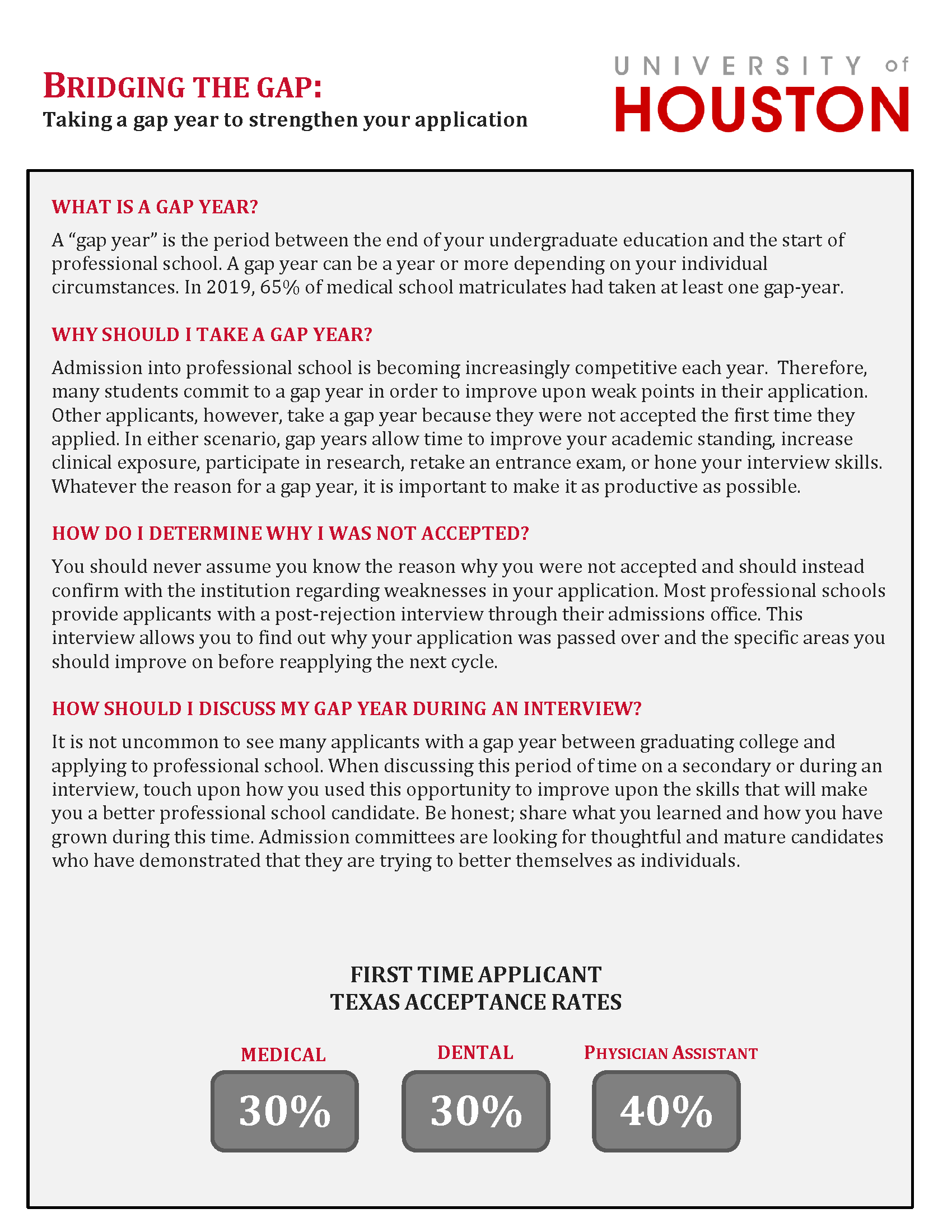Taking a Gap-Year
What is a Gap Year?
A “gap year” is the period between the end of your undergraduate education and the
start of professional school. A gap year can be a year or more depending on your individual
circumstances. In 2019, 65% of medical school matriculates had taken at least one
gap-year.
Why should I take a Gap Year?
Admission into professional school is becoming increasingly competitive each year. Therefore, many students commit to a gap year to improve upon weak points in their application. Other applicants, however, take a gap year because they were not accepted the first time they applied. In either scenario, gap years allow time to improve your academic standing, increase clinical exposure, participate in research, retake an entrance exam, or hone your interview skills. Whatever the reason for a gap year, it is important to make it as productive as possible.
How do I determine why I was not accepted?
You should never assume you know the reason why you were not accepted and should instead confirm with the institution regarding weaknesses in your application. Most professional schools provide applicants with a post-rejection interview through their admissions office. This interview allows you to find out why your application was passed over and the specific areas you should improve on before reapplying the next cycle.
How should I discuss my Gap Year during an interview?
It is not uncommon to see many applicants with a gap year between graduating college and applying to professional school. When discussing this period of time on a secondary or during an interview, touch upon how you used this opportunity to improve upon the skills that will make you a better professional school candidate. Be honest; share what you learned and how you have grown during this time. Admission committees are looking for thoughtful and mature candidates who have demonstrated that they are trying to better themselves as individuals.
What aspect of my application I should work on?
GPA:
Applicants that may have below-average undergraduate overall and science GPAs should consider pursuing post-baccalaureate or special master’s programs. These programs are usually 1-2 years in length. Performing well in these programs prepares you for the preclinical years of professional school and demonstrates to admissions committees an ability to handle hard science content. Many of these programs require the GRE but may substitute MCAT or DAT scores. Letters of recommendation and application essays are also usually required. Carefully review the requirements and deadlines of each program before applying.
SPECIAL MASTER’S DEGREE PROGRAMS IN TEXAS:
- University of Houston: MS in Biology with concentration in Biomedical Science (1-year program)
- University of North Texas Health Sciences Center: MS in Medical Sciences (1-year program)
- Texas Tech University Health Sciences Center: MS in Medical Science (2-year program)
- University of the Incarnate Word COM: MS in Biomedical Sciences (1-year program)
CLINICAL EXPOSURE:
Some students have difficulty balancing clinical exposure while taking classes—thus, one of the most common weaknesses in an application is a lack of experience in clinical and healthcare settings. Professional schools want assurance that an applicant knows what he/she is getting into, and the more clinical exposure an applicant has, the better. A gap year allows for more time to take advantage of volunteering, shadowing and employment opportunities in order to bulk up on your clinical experience.
- SHADOWING/VOLUNTEERING: Admission committees often prefer variety among your clinical experiences. Strong applicants have experienced the different ways that a profession can be practiced (e.g., private vs. hospital-based practice) and the types of specialties available. Even if shadowing/volunteering hours are not a weak point on your application, the additional experience will be looked upon favorably by admissions committees, can be a point of reference during an interview, and can provide additional opportunities to obtain strong letters of evaluation. It also shows that you are maximizing your gap year, while at the same time staying connected to the profession between application cycles.
- EMPLOYMENT: Many students take a gap year to earn a certification so that they may gain clinical experience while also earning an income. For example, you can earn certification as a Medical Assistant, Emergency Medical Technician, Certified Nursing Aide, Dental Assistant, etc. There are also healthcare related jobs that allow insight into the profession without a certification such as a medical scribe, phlebotomist, clinical research assistant, hospital or clinical administrative staff. Houston Community College offers a variety of health science programs.
OTHER FACTORS TO CONSIDER:
- TEST SCORES: Re-taking the MCAT/DAT/GRE or other exam to obtain a higher score is often the quickest way to strengthen an application. Do not rush into a re-take! Carefully evaluate your study skills and practice test scores before committing to a second (or third) attempt. It is crucial that you score higher on subsequent attempts.
- RESEARCH: Involvement in a research lab is quickly becoming an essential part of a competitive application. In fact, many medical schools now expect applicants to have some research experience, even if they do not plan to conduct research later in their career. Research can be done for credit, as a volunteer, or as a paid position.
- COMMUNITY INVOLVEMENT & LEADERSHIP: A gap year is a great opportunity to continue volunteering for organizations that you are passionate about, while at the same time taking advantage of leadership roles within these organizations. Evidence of commitment and active (rather than passive) engagement is paramount. Finding a cause and staying committed is beneficial in two aspects. First, it highlights your individual interests. Second, the more passionate you are about an organization, the more likely you will enjoy the experience.
- RESUME/PERSONAL STATEMENT/INTERVIEW PREPAREDNESS: Both the Writing Center and University Career Services at the University of Houston are excellent resources for Pre-Health students to strengthen their application. Writing and Career Consultants can assist you with perfecting your resume, personal statement, and interview techniques.